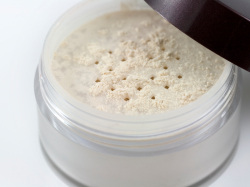 Talcum powder (the main substance found in most baby powders) is also regularly used in popular cosmetics, meaning that women are also being exposed to this potentially carcinogenic material through their makeup in addition to their exposure from baby powder, if they are regular users.
Talcum powder (the main substance found in most baby powders) is also regularly used in popular cosmetics, meaning that women are also being exposed to this potentially carcinogenic material through their makeup in addition to their exposure from baby powder, if they are regular users.
According to a peer-reviewed study published in the October issue of the International Journal of Occupational and Environmental Health, a strong link has been found between mesothelioma lung cancer and the use of talcum powder tainted with asbestos in everyday cosmetics marketed to women in the U.S.
Talc, the soft mineral used to create various types of makeups and of course popular baby powder products, has naturally occurring asbestos contained in it when mined from a natural source. With this in mind, the research who published this talcum powder study wanted to determine if consumers who used talc cosmetic products could be exposed to asbestos through the talc and whether or not that exposure was enough to cause a mesothelioma lung cancer condition.
After years of tracking the talc powder from the mined source to the production of the talc-containing products and finally into examining the lung tissue of a deceased talc product consumer who died of mesothelioma lung cancer, the researchers concluded that not only did the talcum powder indeed contain the carcinogen asbestos, but it also has the potential to cause mesothelioma lung cancer.
Additional tests were performed by the group of researchers, including a test in which the subject wore protective gear while applying talcum powder to his upper body in a bathroom sized sealed room. The air filters used in this talcum powder test chamber allegedly collected high levels of inhalable asbestos particles contained in the talc.
According to these studies, whether a woman uses talc powder based cosmetics or uses baby powder for personal hygiene, she is at a significant risk of exposing herself to a lethal carcinogenic amount of asbestos that could lead to a debilitating form of lung cancer.
History of Johnson Baby Powder Cancer
A popular brand name baby powder that has recently come under fire for baby powder cancer class action lawsuit is Johnson’s Baby Powder. While the cosmetic talc powder has come under fire for increased risk of mesothelioma, Johnson has come under fire for the allegedly increased risk of ovarian cancer when consumers used Johnson Baby Powder on their genitals.
In 1893, Johnson & Johnson began manufacturing and selling their talc powder product. In addition to making baby and adult skin feel soft and clean, Johnson’s Baby Powder has also been marketed as a safe product.
However, in 1960, researchers began to study the effects of the use of talc powder and an increasing trend of ovarian cancer. Study after study demonstrated a shockingly strong correlation between the use of talc powder and a woman’s risk of developing ovarian cancer later on in life.
In light of these studies, many female consumers have filed baby powder cancer lawsuits or have joined existing Johnson’s Baby Powder class action lawsuits.
Do YOU have a legal claim? Fill out the form on this page now for a free, immediate, and confidential case evaluation. The attorneys who work with Top Class Actions will contact you if you qualify to let you know if an individual lawsuit or class action lawsuit is best for you. [In general, baby powder cancer lawsuits are filed individually by each plaintiff and are not class actions.] Hurry — statutes of limitations may apply.
ATTORNEY ADVERTISING
Top Class Actions is a Proud Member of the American Bar Association
LEGAL INFORMATION IS NOT LEGAL ADVICE
Top Class Actions Legal Statement
©2008 – 2025 Top Class Actions® LLC
Various Trademarks held by their respective owners
This website is not intended for viewing or usage by European Union citizens.
Get Help – It’s Free
Join a Free Baby Powder Cancer Class Action Lawsuit Investigation
If you used Johnson’s Baby Powder, Shower to Shower, or another talcum powder product and were diagnosed with ovarian cancer, you may have a legal claim. Family members of loved ones who died of ovarian cancer can also join. Submit your information now for a free case evaluation.
An attorney will contact you if you qualify to discuss the details of your potential case at no charge to you.












